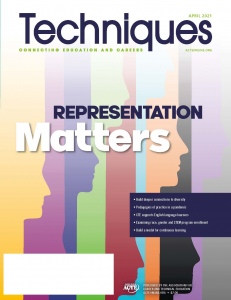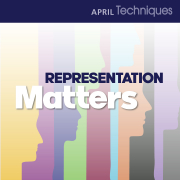Representation matters. Read Techniques in April
 Workforce development starts in our career and technical education (CTE) programs. As a global economy expands further, CTE must consider its role and responsibility to improve representation — among our role models, partners and in the classroom.
Workforce development starts in our career and technical education (CTE) programs. As a global economy expands further, CTE must consider its role and responsibility to improve representation — among our role models, partners and in the classroom.
Representation matters.
This April issue of Techniques features articles from educators and CTE stakeholders designed to inspire reflection as well as action. We must confront vast systemic inequities in order to design more equitable learning opportunities in fields such as science, engineering, technology and math (STEM). Michael Owens wrote,
“A large amount of STEM course material does not include equitable representations of success. This lack of diversity leads students to perceive that they do not fit the mold, that they don’t have what it takes to be successful within the STEM field. When teachers present diverse recruitment material, students develop greater regard for the content area.”
The Center for Global Education at Asia Society, a group that partners with organizations and educators to craft professional development courses and resources, encourages readers to build deeper connections to diversity. Their research proves that a diverse workforce is more productive and happier overall.
Jennifer Manise, Kirsten Bullington and Heather Singmaster wrote, “How do you attract a more diverse set of students into your classes? How do you prepare them with both technical skills and the global mindset needed to succeed?
“To build a more inclusive classroom, you must begin to understand your own point of view.” Before connections may be made with students, CTE teachers and administrators must learn to recognize and dismantle their own implicit biases.
ACTE promotes high-quality CTE programs for diverse audiences.
We continue to build an inclusive culture that encourages, supports and celebrates the diversity of the CTE community. ACTE remains committed to equity, access, inclusion and diversity (IAED). ACTE’s IAED Advisory Group provides recommendations, expertise and outreach to support ACTE’s IAED initiatives. Members and stakeholders are encouraged to contribute:
- Offer resources and speaker suggestions to include on a dedicated IAED webpage
- Submit a proposal for the IAED in CTE column in Techniques
- Encourage your local CTE community to reference the Access and Equity element in ACTE’s Quality CTE Program of Study Framework
- Join the IAED Advisory Group
In addition, the IAED Mentorship Program is open to any ACTE member interested in educational equity. Participants review literature and engage in productive discussions about the issue of representation — and why it matters so deeply.



